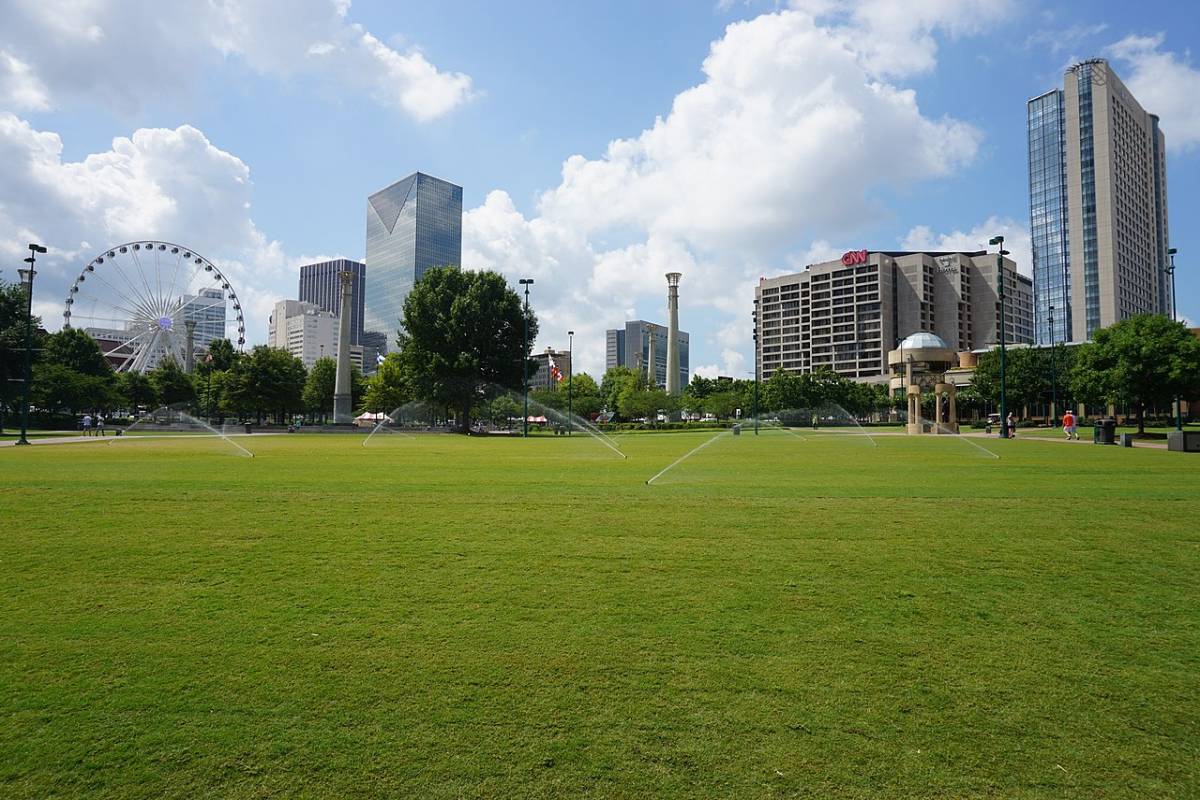
With cold and wet winters and hot, muggy summers, the Peach State has unique lawn care perks and challenges. Clay soil, more moisture than you might need, and persistent weeds are just a few. Here are some practical tips for maintaining your lawn in Atlanta despite these challenges:
- Irrigate for Atlanta’s Soil Type
- Adapt to Atlanta’s High Humidity
- Aerate to Keep the Roots Healthy
- Mow Regularly
- Fertilize Your Lawn with Grass Clippings
- Keep an Eye on Bare Patches
- Keep Weeds Under Control
- Overseed in the Fall
1. Irrigate for Atlanta’s Soil Type
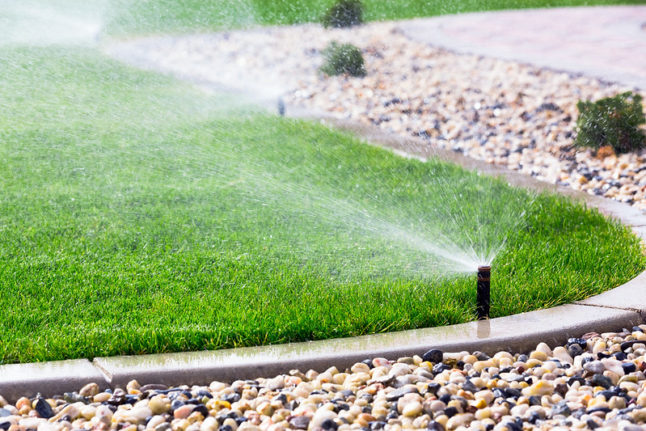
Bermudagrass, fescues, Zoysiagrass, and other turfgrasses common to The Big A need about 1 inch of water per week. The trick is to water them gradually and deeply.
Atlanta’s soil is mostly clay and absorbs water slowly. You need to set your sprinkler system to ½ inch of water per hour or less to avoid the following:
- Puddling
- Excessive moisture
- Fungi
- Insects
Rotor sprinklers are better than spray models for this type of irrigation. They work at ¼ to ½ inch of water per hour. With spray sprinklers, you typically apply 1 or 2 inches per hour.
Water once a week in five or six cycles, leaving an hour between cycles for absorption. The grass will grow deeper roots, making it more resilient to drought.
As for the perfect time to water, Georgia’s non-drought outdoor water use schedule allows irrigation between 4:00 p.m. and 10:00 a.m. While the evening is also a good option, it’s best to water the lawn as early as possible in the morning. This way, sunlight will evaporate excess water that your clay soil fails to absorb.
Pro Tip: Check your sprinkler system regularly to make sure it works properly, so you don’t waste water.
2. Adapt to Atlanta’s High Humidity
Summers are known to be hot and muggy in Atlanta, and lawns can suffer because of too much moisture. When the humidity in the air is high, change your lawn maintenance routine accordingly:
- Check the grass and soil to ensure it needs watering.
- Water less.
- Clean up branches, remove debris from the lawn, and move outdoor furniture or decorations that can hinder water evaporation.
- Rake fallen leaves to expose the moist soil to the sun.
3. Aerate to Keep the Roots Healthy
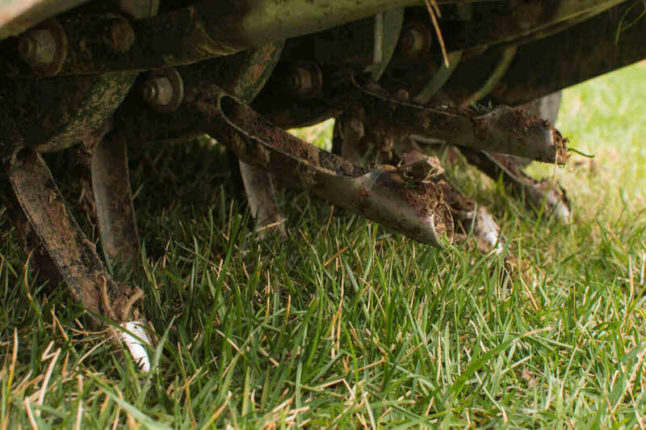
Clay soil is dense, with tiny pores. Its texture makes it harder for air, water, and nutrients to reach grass roots. Aerate your Atlanta lawn at least once a year to loosen the soil. This helps the turfgrass receive what it needs to grow and thrive.
Aeration is part of the standard lawn care services offered by any Atlanta lawn care company. The landscaper removes small cylinder-shaped plugs from your turf to make tiny holes that help air, water, and nutrients reach your grass’s roots.
When to aerate: Aerate cold-season grasses, such as fescue, in late summer or fall, the perfect. Warm-season grasses should be aerated in springtime or early summer.
4. Mow Regularly
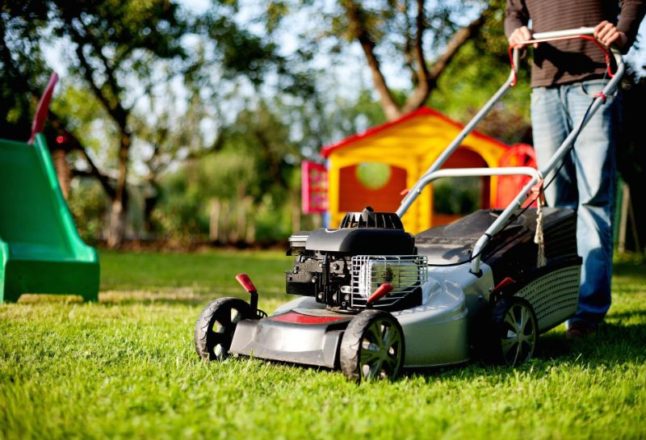
Regular mowing keeps your grass healthy and thriving. Cut up to (but no more than) ⅓ of the grass’s height, keeping the lawn at 1 to 3 inches tall, depending on the type of turfgrass.
Bermudagrass and Zoysiagrass make up 90 to 95% of the turfgrasses planted in the Metro Atlanta area. They begin to green up in April and need mowing during their growing season, from May to October.
If you have tall fescue in your yard, keep your lawn mower oiled and ready to go all year round. With a shorter dormant period, fescues are active before the dogwood blooms and keep growing long after the Music Midtown says goodbye to its guests.
5. Fertilize Your Lawn with Grass Clippings
Instead of bagging the grass clippings after you mow, use them as a natural fertilizer. They can provide up to 30% of the nitrogen your lawn needs. Worried about thatching? If you keep the cuttings short, they won’t add to the thatch but decompose fast and feed the soil.
Rain and a busy schedule can bring the grass halfway to your knees before you know it. When this happens, use part of the clippings as mulch in your garden, around trees, and on flower beds.
Consider a mulching mower. With such a tool, the mower blades cut the grass clippings, over and over again, into tiny pieces. Containing up to 90% water, such small clippings of grass dry out and decompose even faster.
6. Keep an Eye on Bare Patches
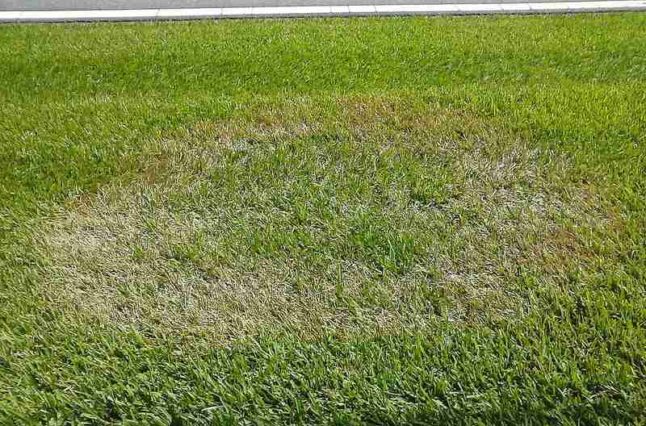
Bare spots in your lawn don’t only give it a bad look. They are great opportunities for weeds to emerge. Weak and dead grass patches are also excellent for fungi and insects to colonize.
Ensure those bare spots are not left unchecked. You can easily prevent these lawn problems by:
- Manually watering small areas of the lawn that seem drier than the rest.
- Overseeding bare patches in late summer and early fall with the same grass seeds. This keeps the lawn a beautiful, fresh mass of green blades.
- Limit foot traffic in more sensitive areas until the grass is healthy enough to sustain it.
7. Keep Weeds Under Control
Atlanta’s warm and humid climate can create problems for the average homeowner with a lawn in the City of Trees. In 2018, the National Association of Landscape Professionals ranked Atlanta as No. 1 among the worst cities for weed and lawn disease.
Don’t worry. Weed control is easy if done timely and the right way. Here are a few simple solutions to take care of your lawn and keep it weed-free:
- Apply pre-emergent herbicides to prevent weeds from sprouting. February and March are the months to do so. Late fall and winter treatments are also an option, October through December. You can find out more about seasonal treatments from our detailed Atlanta lawn maintenance guide.
- Use post-emergent herbicides on weeds that have already sprouted. They eliminate broadleaf and grassy weeds such as chickweed, wild violet, and crabgrass.
- Pull the weeds manually. Do this only when the soil is damp to prevent taking too much soil with their roots and disturbing the turf layer.
8. Overseed in the Fall
Dense, healthy grass prevents weeds from emerging and thatch from forming on the soil level. Bermudagrass and Zoysia, Atlanta’s favorite turfgrasses, are self-spreading species and typically don’t require overseeding. Fescues, on the other hand, need help to fill in thinning areas.
Overseed a fescue lawn in the fall, when temperatures are friendly for new plants, and make sure to aerate first. We have more tips about lawn maintenance at the end of the year in our Atlanta guide for fall lawn care.
FAQ
The typical Atlanta lawn thrives with once-a-week irrigation. Apply 1 inch of water in repeated cycles with breaks to allow proper absorption. Soaking the lawn like this and then allowing it to dry during the week helps the roots grow deeper and allows the soil to oxygenate.
Bermuda and Zoysiagrass, the most common types in the Atlanta area, need fertilizers during their growing season, from March until October. Apply every 4 to 6 weeks.
Stop watering when the lawn receives 1 inch of water or more weekly from rainfall. Too much moisture exposes the turfgrass to fungi and rotten roots.
Enjoy a Green, Lush Atlanta Lawn Today!
Beautiful lawns are a treasure for the local community. They add curb appeal to neighborhoods and a relaxing outdoor space for families. In Atlanta, Georgia, the City of Trees, thick, dense grass is more at home than anywhere in the U.S. But the humid climate can sometimes make it difficult to keep the lawn healthy and thriving.
When this happens, remember you’re not alone. Professional landscapers can help with everything, from routine lawn maintenance to special treatments. Find a lawn care company in Atlanta and enjoy a green, lush lawn today!
Main Photo Credit: Michael Barera / Wikimedia Commons / CC BY-SA 4.0